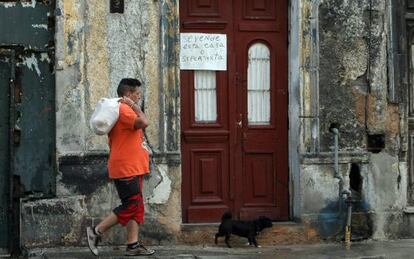Alan Gross case trips up thawing relations between US and Cuba
The American contractor has spent five years in a Havana prison for “subversion”


“The rumors have reached a frenzy,” said Republican Senator Jeff Flake of Arizona on Tuesday in Washington, D.C. Flake was referring to the normalization of diplomatic relations between the United States and Cuba. The senator is one of Capitol Hill’s foremost proponents of the initiative.
Since Barack Obama entered the White House in 2009, bilateral relations have become more flexible: the American government allows Cuban-Americans to travel to the island and to send remittances from the United States to Cuba. And there are signs of an economic liberalization on the island. Influential people such as Hillary Clinton, a possible candidate for the presidency, and exiled Cuban sugar tycoon, Alfonso Alfy Fanjul, question the embargo. More than half-a-century after the two countries officially broke off diplomatic relations, supporters of rapprochement see signs for optimism.
According to several senators and other individuals involved in the development of US-Cuban relations, the imprisonment of 65-year-old American volunteer Alan Gross is one of the main obstacles to normalizing relations. Gross was arrested on December 3, 2009 in Havana. This Wednesday marks his fifth year in prison on the island. Gross traveled to Cuba as part of his work as a contractor for the United States Agency for International Development (Usaid). His mission was to distribute computers and satellite telephone equipment to members of the Jewish community. In 2011, a court sentenced him to 15 years in prison for acts against the independence and territorial integrity of the Cuban state and for engaging in subversive activities.
“Without [Gross’s liberation] it will be very difficult to move forward,” Flake said after delivering a speech at the Center for Strategic and International Studies (CSIS). It would be difficult for Obama to change US policy toward Cuba while Alan Gross remains in prison, a move that would make him vulnerable to criticism for making concessions without asking for anything in return.
“Unfortunately, Alan Gross is trapped in these frozen diplomatic relations between the United States and Cuba,” says Democratic Senator Tom Udall of New Mexico via e-mail. In November, Udall and Flake visited Cuba and they met with Gross for two hours. “His imprisonment,” Udall says, “slows down any forward movement when it comes time to normalize relations with Cuba, but the diplomatic freeze between the two countries also prevents progress toward his liberation. It’s a vicious cycle.”
Five against One
September 1998: The United States arrests five Cuban spies in Florida. Three of them are still in prison.
December 2009: Cuba arrests Alan Gross, a volunteer subcontractor hired by the US government to deliver communications equipment on the island.
March 2011: A Cuban court sentences Gross to 15 years in prison for taking part in “a subversive project” and for “acts against the independence and integrity of the State.”
December 2014: Five years after his arrest, Gross’ health and morale have deteriorated and he remains an obstacle to efforts to reset US-Cuban relations.
Efforts to free Gross, whose health has suffered during his imprisonment, are not new. “I failed when I tried to bring him to the United States,” says Bill Richardson, who served as New Mexico governor and US representative at the United Nations during the Clinton administration. Richardson has worked as a mediator with countries such as Cuba and North Korea. He traveled to Cuba in September 2011. His goal was to free Alan Gross. He says it was a personal mission but that the Obama administration authorized him to say that if the Gross case was solved, Washington could then open up a dialogue with Cuba on other issues.
Richardson says the mission failed, in part, because Cuban officials realized that Gross was a valuable asset. “It was the first time they began to say publicly that they wanted to exchange Gross for the three prisoners,” he explains, in reference to the Cubans who were arrested in 1998 in Florida on espionage charges. Two of them have returned to the island and three remain imprisoned in the United States. Havana has proposed exchanging the three prisoners for Gross.
On Monday, a State Department employee who asked to remain anonymous told journalists: “We have always said that there is no comparison between Gross and those three prisoners.” According to the source, the three Cubans were convicted of crimes related to espionage – a function different from the one Gross exercised.
Gross’s wife has said that she worries her husband may do “something drastic,” if he does not get out soon. His mother died in June. “It’s been five years,” says Senator Flake. “I want our government to do everything possible to guarantee his liberation.”
Translation: Dyane Jean François
Tu suscripción se está usando en otro dispositivo
¿Quieres añadir otro usuario a tu suscripción?
Si continúas leyendo en este dispositivo, no se podrá leer en el otro.
FlechaTu suscripción se está usando en otro dispositivo y solo puedes acceder a EL PAÍS desde un dispositivo a la vez.
Si quieres compartir tu cuenta, cambia tu suscripción a la modalidad Premium, así podrás añadir otro usuario. Cada uno accederá con su propia cuenta de email, lo que os permitirá personalizar vuestra experiencia en EL PAÍS.
¿Tienes una suscripción de empresa? Accede aquí para contratar más cuentas.
En el caso de no saber quién está usando tu cuenta, te recomendamos cambiar tu contraseña aquí.
Si decides continuar compartiendo tu cuenta, este mensaje se mostrará en tu dispositivo y en el de la otra persona que está usando tu cuenta de forma indefinida, afectando a tu experiencia de lectura. Puedes consultar aquí los términos y condiciones de la suscripción digital.








































